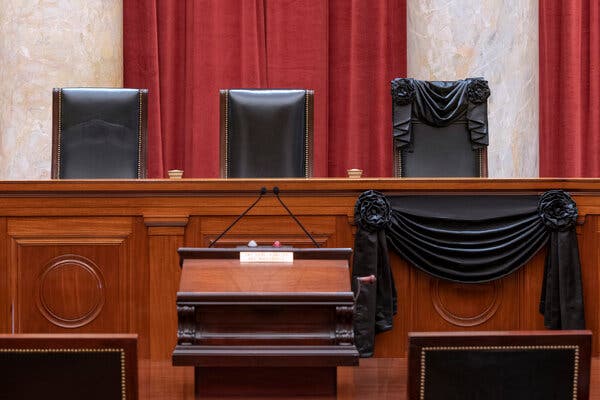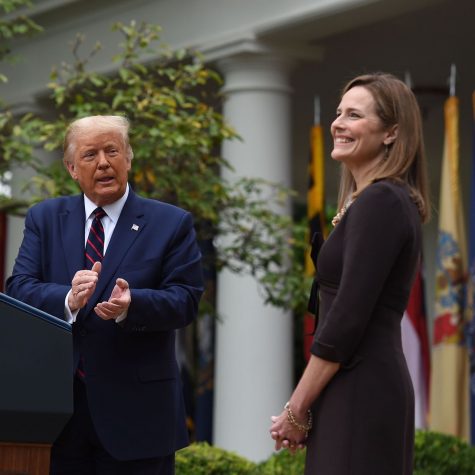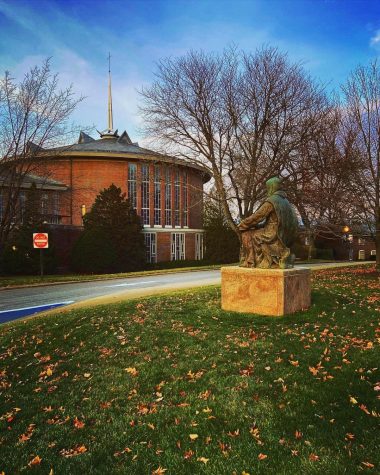Justice Ginsburg’s death shakes up 2020 election

A black ribbon is draped over Justice Ginsburg’s seat in the Supreme Court.
October 2, 2020
The death of Supreme Court Justice Ruth Bader Ginsburg has changed the 2020 presidential election and shifted American politics, opening up yet another gap in the intense partisan divide. Ruth Bader Ginsburg, 87, died at her home in Washington on Sept. 18 from complications of pancreatic cancer. Ginsburg, a liberal and feminist icon known by her initials, RBG, has given Republican President Donald Trump an opportunity to cement a conservative stronghold in the Supreme Court.
If conservative judge Amy Coney Barret is confirmed as Ginsburg’s replacement—all evidence points to a surefire confirmation—then conservatives will hold six of the court’s nine seats. There are a number of ramifications stemming from this.
The first, and most obvious ramification is that conservatives will be able to pass verdicts without needing the support of Chief Justice John Roberts, a conservative who very occasionally sides with the liberal wing. This could mean that any number of issues that Republicans have promised to deal with may now be resolved. Roe v. Wade, the case that made abortion legal nationwide, may be overturned, something Republicans have been vowing to do since the case was ruled in 1973.
The Affordable Care Act, commonly referred to as Obamacare, may also be deemed unconstitutional by a conservative court. Finally, if Democrats flip the Senate and the White House this November (a big “if”), any new gun control bills or environmental protections could be struck down by the nation’s highest court.
Another major ramification of Ginsburg’s death is it has completely changed the nature of the 2020 election. Republicans may see the need to fill the seat as a rallying cry, resulting in a large pro-Trump turnout in November. Alternatively, the Democrats might see it as all the more reason to turn out in large numbers in the upcoming election. The presidential race, which had been focused on the COVID-19 pandemic and racial justice, is now centered around the Supreme Court battle that is ensuing over Ginsburg’s replacement.

It is unclear which side benefits from this fight or if, come November, voters will even be thinking about any of this. This shift in focus has also complicated things for conservative senators running in liberal states, like Susan Collins of Maine. Collins is in a fight for her political future and the nomination battle has caused Mainers to remember Collins’s actions during the Brett Kavanaugh hearing back in 2018. This is troubling for Collins, who has refused to support a Supreme Court hearing until after the election, because a majority of Mainers did not approve of her actions back then.
Perhaps the biggest ramification of Justice Ginsburg’s death is that it serves as one more opening in the partisan divide. Depending on which party a voter identifies with, they either see Ginsburg’s death and the rush to fill her seat as a sign of Republican hypocrisy or Senate Majority Leader Mitch McConnell and President Trump fulfilling their constitutional duties. Democrats point to McConnell’s refusal to have a hearing for Merrick Garland, the liberal judge then-President Obama nominated to fill a vacancy after the death of conservative Justice Anthony Scalia in 2016. They argued that since Republicans now benefit from the situation, they are abandoning their 2016 argument that a seat should not be filled during an election year.
Republicans have fired back, saying that this time is different because the Senate and the White House are of the same party. In an age of hyper-partisanship, where one half of Americans are dealing with a different set of facts than the other half, this Supreme Court battle will almost certainly divide the country down party lines more so than it already is.
It is important to remember that Supreme Court Justices hold their positions until death or retirement. As a result, regardless of the outcome, the ensuing battle will have ramifications that will affect the United States for decades to come.












